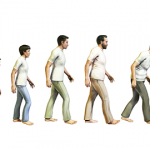Does Age Affect Our Medical Decision Making?
As rheumatologists, we constantly factor the age of the patient into our treatment algorithms. Is a patient too old or too young to treat? How aggressive should therapy be? Or, should we leave well enough alone? Years ago, I was asked to evaluate a lovely 92-year-old nursing home resident for the management of gout. Rita was a delightful woman whose sound and vibrant mind resided in a body that could no longer sustain her living independently. This episode of podagra was her second, the first occurring five years earlier. After carefully reviewing the therapeutic options, I decided to treat her attack symptomatically and not start allopurinol therapy. I came to regret that decision.
Twelve years later, I saw Rita again. Lovely and sharp as ever, she had just turned 104. Apparently, one of the nursing home staff doctors was concerned that a new finger swelling represented an abscess and he attempted to lance it. Unfortunately, the swelling was a tophus, which, following this ill-timed procedure quickly became infected. Ultimately, the digit had to be amputated. Despite this measure, Rita developed septicemia and passed away. In hindsight, I should have started allopurinol when I first met Rita, but I did not expect her to live long enough to benefit from the drug.
I took this lesson to heart when, several years later, I met another woman, who, coincidentally, was named Rita. The matriarch of a large and loving family, Rita had resisted seeing a doctor for her arthritis symptoms. Her mobility was in decline and, as she told me, “I did not want to spend my last days being pushed around in a wheelchair.” Rita had a fairly impressive joint exam; boggy, symmetric polyarthritis was apparent. Clearly her immune system had not receded into senescence. A combination of methotrexate and a biologic disease-modifying drug worked wonders treating her seropositive rheumatoid arthritis (RA). When I last saw her a month ago, she was turning 99, still taking her medications, and looking forward to swinging a golf club next spring.
Theories of Aging
Four major theories on the mechanisms of aging have been suggested.
The wear-and-tear theory proposes that all living things that exist under the control of time may be damaged either by extrinsic environmental damage such as radiation, free radicals, infections, and attacks from the predators or by intrinsic environmental damage such as free radicals and metabolites. This damage may induce somatic mutations leading to the acceleration of aging or even malignancy. A corollary to this concept is the wear and repair theory, which proposes that there are, in fact, mechanisms of inheritable maintenance and repair. For example, this view is supported by the observation that many patients improve their cardiovascular functional status following myocardial events. Similarly, many of our older patients with partial tendon tears show evidence for repair over time. Yet, inevitability, the wear side of the equation wins.



